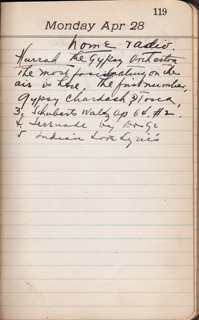
Another unimportant day
home and radio.
The Gypsy String Orchestra
entertained me from the air.
Every night going to bed
reading, newspapers usually
the “News” until I get sleepy,
and so it goes night after night.
Here within the confines of my
little nest, I spend my dreary
hours dreaming,
Here many [of my] youthful dreams
were vanished.
————–
Matt’s Notes
After a brief respite two days ago, Papa’s malaise has returned in full force. Yesterday he admitted to himself that Henriette, a.k.a. the 20th Century Girl, was not going to respond to the letter of affection he wrote her a week earlier. He had idealized and become infatuated with her quite quickly, so this sudden acceptance of her disinterest, or at least his realization that she was human, unreliable, and not inclined to behave exactly as he needed her to, would have left him a bit bereft. (I expect most idealists and daydreamers would recognize this cycle of excitement and disappointment.)
I wonder, too, if the recent birth of Papa’s nephew had, in some way, attenuated his longing for a family of his own, or for that matter his own family (including his ailing father) back in Eastern Europe. I suppose the music of the “Gypsy String Orchestra” wouldn’t have helped his homesickness any, especially if it sounded as wistful as this:
Speculation aside, we know it was not unusual for Papa to suffer bouts of melancholy or for the ghosts of his “vanished” dreams to haunt him when he was home alone. If only a ghost from the future could have visited and said
Papa, this is you:

——————
Additional notes:
When Papa mentions the news of the day in this entry, he capitalizes the word “News” and writes it in quotation marks (note the older-style placement of the opening quote to the lower left of the quoted term):

Why did he do this? Was “News” considered a vernacular term back then when used to refer to the contents of a newspaper? Or did he quote the term because it was new to him and he wasn’t quite sure if he was using it right?
Regardless, the “News” Papa read before retiring that day would have provided plenty of additional fuel for his blue mood. Some of the less encouraging headlines included:
- Motorist, In Accident, Also Slays Companion and Injures Fiance
- MUSSOLINI SCORES AT ITALIAN POLLS; Heavy Vote Makes Fascisti Confident of Winning Parliamentary Majority
- HITLER PARTY SWEEP IN MUNICH ELECTION; Communists Also Likely to Gain More Seats in the Bavarian Diet
- ARMY TO END POGROMS.; Rumanian Government Puts Universities Under Martial Law
- LIBERALS ALARMED BY GERMAN TREND; Rising Nationalist Sentiment Is Reflected Clearly Abroad as Well as Internally
Note that the stories about the Nazi party’s rising influence came on the heels of the recently-concluded Beer Hall Putsch trial (Hitler had just received an incredibly light sentence for trying to overthrow the German government, the surest sign yet of his rising influence and popularity). I must admit I didn’t have this in mind when it occurred to me to list potentially upsetting New York Times headlines from April 7, 1924, but I’m sure Papa was preoccupied with the implications.
—————–
References:
Papa mentions “The Gypsy String Orchestra” in this entry, and while I was able to find some 1940-ish references to an ensemble by that name at the Museum of Television and Radio, I’m not sure if they existed as such in the 1920’s or if Papa just used a generic term to describe the type of music he heard. In any event, the clip I included above is called “Hungarian Folksong Melody” and is, according to archive.org, a 1914 recording by Berkes Bela.


